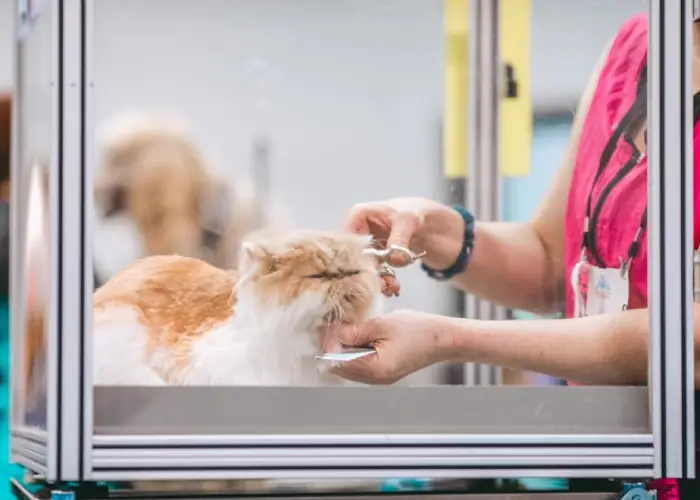
Separation anxiety in dogs is a common but challenging behavioral issue that affects many pet owners. Whether you’re returning to the office after working from home or searching for “dog boarding near me” for an upcoming trip, understanding how to help your furry friend cope with time apart is essential for their wellbeing and your peace of mind.
Understanding Separation Anxiety
Recognizing the Signs
Dogs with separation anxiety often display distinct behaviors when their owners prepare to leave or are absent:
- Excessive barking or howling
- Destructive behavior, especially near exits
- Intense pacing
- Inappropriate elimination
- Excessive drooling
- Escape attempts
- Following owners from room to room
When researching “dog boarding near me,” it’s crucial to discuss these behaviors with potential facilities, as professional caregivers should be experienced in managing anxiety symptoms.
The Root Causes
Several factors can contribute to separation anxiety:
- Past trauma or abandonment
- Changes in routine or environment
- Lack of proper socialization
- Over-attachment to owners
- Genetic predisposition
- Major life changes
Professional Training and Preparation
Starting with Short Departures
Begin with brief absences and gradually increase duration. Quality dog boarding facilities often use similar techniques when acclimating new dogs to their environment. When searching for “dog boarding near me,” look for facilities that offer adjustment periods and individualized attention.
Creating a Positive Association
Make departures and arrivals low-key events. Professional boarding facilities often recommend:
- Avoiding emotional goodbyes
- Creating distraction routines
- Using special toys only during alone time
- Providing comfort items from home
Environmental Management
Setting Up a Safe Space
Create a comfortable area where your dog feels secure:
- Designate a specific room or zone
- Include favorite beds or blankets
- Provide engaging toys
- Consider using calming music
- Maintain comfortable temperature
When evaluating “dog boarding near me” options, look for facilities that offer similar comfortable, private spaces for each pet.
Using Environmental Enrichment
Keep your dog mentally stimulated when alone:
- Interactive toys and puzzles
- Hidden treats around the space
- Background noise (TV or radio)
- Window views of outdoor activity
- Automatic treat dispensers
Professional Support and Solutions
Working with Experts
Consider consulting with:
- Professional dog trainers
- Veterinary behaviorists
- Experienced boarding facilities
- Pet anxiety specialists
Many reputable dog boarding facilities have staff trained in managing separation anxiety and can provide valuable insights into helping your pet adjust to time apart.
Medical Considerations
Consulting Your Veterinarian:
- Professional evaluation
- Anxiety medication options
- Health check to rule out medical causes
- Natural calming supplements
- Behavior modification plans
Building Independence
Daily Training Exercises
Implement activities that promote confidence:
- “Stay” training with increasing distance
- Independent play sessions
- Crate training when appropriate
- Socialization with other dogs
- Confidence-building exercises
When searching for “dog boarding near me,” ask about their training philosophies and how they help dogs build independence.
Establishing Routines
Consistent Daily Schedules:
- Regular feeding times
- Scheduled exercise sessions
- Consistent potty breaks
- Set play periods
- Structured alone time
Professional Boarding Preparation
Making the Transition Easier
Before booking with a “dog boarding near me” facility:
- Schedule meet-and-greets
- Start with short stays
- Provide familiar items
- Share detailed behavior information
- Maintain regular communication
Prevention Strategies
Early Socialization
Prevent anxiety development through:
- Puppy socialization classes
- Exposure to various environments
- Positive experiences with multiple caretakers
- Gradual independence training
- Regular social interaction
Long-term Management
Ongoing Support:
- Regular exercise routines
- Continued training
- Social interaction
- Professional support when needed
- Consistent household rules
Technology and Tools
Modern Solutions
Consider using:
- Pet cameras for monitoring
- Smart feeders for routine
- Automatic toy dispensers
- Calming aids (ThunderShirts, etc.)
- GPS tracking devices
The Role of Exercise
Physical Activity Benefits:
- Morning walks before departure
- Interactive play sessions
- Agility training
- Swimming or running
- Structured play with other dogs
When researching “dog boarding near me,” inquire about exercise programs and activity schedules.
Special Considerations
Senior Dogs
Older dogs may need:
- Modified exercise routines
- More frequent potty breaks
- Extra comfort items
- Gentle anxiety management
- Close medical monitoring
Multiple Pet Households
Consider how companions affect anxiety:
- Pet interactions during alone time
- Shared space management
- Individual attention needs
- Combined training approaches
Conclusion
Managing separation anxiety requires patience, consistency, and often professional support. Whether you’re working on daily departure routines or searching for “dog boarding near me” for vacation care, remember that every dog is unique and may require different combinations of these strategies. The key is to remain patient and positive while working through the process.
With proper training, environmental management, and professional support when needed, most dogs can learn to feel more comfortable during periods of separation. Remember to celebrate small victories and maintain consistent routines to help your furry friend build confidence and independence over time.





